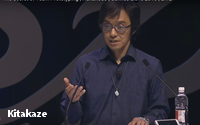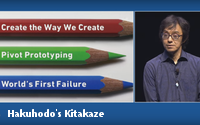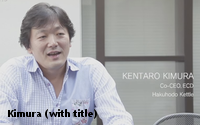Commentary
Pivot Play: How Hakuhodo Learned To Fail Fast, Create Beta Shops
- by Joe Mandese @mp_joemandese, June 20, 2016
 CANNES, FRANCE -- In what
could well be called a “Lean Agency” approach to ad industry innovation, Hakuhodo Worldwide CCO Masaru Kitakaze made a case for the “beta agency” during a keynote today at the
Lions Festival of Creativity here.
CANNES, FRANCE -- In what
could well be called a “Lean Agency” approach to ad industry innovation, Hakuhodo Worldwide CCO Masaru Kitakaze made a case for the “beta agency” during a keynote today at the
Lions Festival of Creativity here.
“Beta is sample software that users can try before the final versions come out,” Kitakaze explained, adding: “I think this beta concept in Silicon Valley is applicable in creative team-building.”
Noting that Japan’s Hakuhodo is a 120-year-old global ad agency organization, with more than 10,000 employees worldwide, Kitakaze said it -- like any big, old organization -- suffers from “big company sickness.” The way to offset it, he said, is to utilize a “beta” approach to agencies.
“Agency beta is a concept that shows the way forward for advertising agencies by mutating and exposing ourselves in the changing market,” he said, adding: “To me, the entrepreneurs in Silicon Valley are saying the same thing. In the advertising industry, we need agency beta.”
Kitakaze said Hakuhodo has identified three key principles to creating a beta agency culture.
“The first key point is to create the way we create. I believe the best way to generate something inn ovative is to continuously change the way we
create,” he said, adding that beta shops should be designed to “seek the fewest moves to produce the maximum impact.”
ovative is to continuously change the way we
create,” he said, adding that beta shops should be designed to “seek the fewest moves to produce the maximum impact.”
“The second key point is to pivot prototype,” he said, striking an analogy to a basketball player who is required to keep their “pivot leg” anchored in one place and allowing the other to move freely. The pivot leg in beta agency organizations, he said, is the one that is rooted in traditional ad agency culture and organizations, while the other one is intended to roam freely in new frontiers.
“The third key point is about failure,” Kitakaze concluded, noting that the greatest creativity and innovation often begins with the biggest failures. “Make new failures before everyone else in the world,” he advocated, before giving a powerful example of how seminal Hakuhodo beta shop -- Kettle -- did exactly that.
Kettle, which was formed 10 years ago, strove to break historic agency culture traditions. It began by getting rid of formal titles and business cards, even though Kitakaze proceeded to interview Kettle CEO Kentaro Kimura, whose title was superimposed on the video of him shown on the screen to Lions Festival attendees.
In reality, Kettle did away with “field-specific,” or functionary, titles like copywriter and art director, so its 30-person team could focus on collaborating and developing interdisciplinary skills necessary to think out of the box and innovate new ideas and ways of creating advertising.
Its first and most valuable lesson in trying to apply that approach, Kimura told Kitakaze, was also its first major failure: an attempt to create a user-generated content campaign in which consumers would envision one of its clients' next generation of products, and the advertising that would promote it.
Kimura described it as a “huge failure” because it failed to put social media moderators in place to filter the user-generated content, which came through uncensored.
“We got a lot of funny and thoughtful submissions, but at the same time, a flood of inappropriate submissions were uploaded on the Web,” he recalled, adding: “There were a lot of (expletive deleted) and (expletive deleted) and other offensive words, and nasty words and antisocial captions. We closed the site as fast as possible. It was really a nightmare.”
The
l esson, Kimura said, was that
the agency learned it couldn’t do everything by itself, even with its cross-discipline approach. And so it began collaborating with outside experts, including academic researchers, doctors,
lawyers, and architects.
esson, Kimura said, was that
the agency learned it couldn’t do everything by itself, even with its cross-discipline approach. And so it began collaborating with outside experts, including academic researchers, doctors,
lawyers, and architects.
Kimura then showcased an amazing campaign for Kettle cosmetics client Red, which transformed not just the brand, but the self-esteem of women in Japan’s culture.
The project began with research indicating that the vast majority (70%) of Japanese households no longer call women by their given name when they have a child, but instead call them “mother” or “mom,” etc. Working with scientific researchers, Kettle conducted an experiment to see what happened when husbands began calling them by their first name again.
The study measured the physiology of 19 women participating in the experiment and found that simply being called by their own name caused physical changes inside their bodies, boosting their oxytocin levels 15.9%.
The agency described oxytocin as the “beauty hormone,” and said the effect was that Japanese women felt more beautiful. After promoting the findings at a major academic research conference and incorporating it into its PR and advertising, Red’s brand reputation jumped 27% and its sales soared 144%.
More importantly, Kitakaze said, “Japanese women felt more beautiful.”
Kitakaze provided examples of other Hakuhodo beta agencies working in product design and film / content marketing, but the overall takeaway was to apply Silicon Valley startup techniques like failing fast, pivoting and iterating, in order to create breakthrough ideas and innovation.















